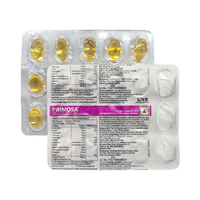Rs.110for 1 strip(s) (10 tablets each)
food interaction for Glimsat A
alcohol interaction for Glimsat A
pregnancy interaction for Glimsat A
lactation interaction for Glimsat A
food
alcohol
pregnancy
lactation
Glimsat A 500mg/2mg/10mg Tablet should be taken with or after food.
Glimsat A 500mg/2mg/10mg Tablet may cause stomach upset if taken on empty stomach.
None
Glimsat A 500mg/2mg/10mg Tablet may cause stomach upset if taken on empty stomach.
None
CAUTION
It is unsafe to consume alcohol with Glimsat A 500mg/2mg/10mg Tablet
UNSAFE
Glimsat A 500mg/2mg/10mg Tablet is highly unsafe during pregnancy. It can cause serious harm to the unborn baby, including birth defects and pregnancy loss. Do not use this medicine if you are pregnant or planning to become pregnant.
UNSAFE
Glimsat A 500mg/2mg/10mg Tablet may be safe to use during breastfeeding. Animal studies have shown low or no adverse effects to the developing baby; however, there are limited human studies.
SAFE IF PRESCRIBED
SALT INFORMATION FOR Glimsat A
Metformin(500mg)
Uses
Metformin is used in the treatment of type 2 diabetes mellitus and polycystic ovarian syndrome (PCOS).
How it works
Metformin is an anti-diabetic medication (biguanide). It works by lowering glucose production in the liver, delaying the absorption of sugar (glucose) from the intestines, and increasing the body's sensitivity to insulin.
Common side effects
Diarrhea, Headache, Vomiting, Nausea, Flatulence, Indigestion, Vitamin B12 deficiency, Abdominal discomfort, Hepatitis (viral infection of liver), Drug eruptions, Lactic acidosis, Hypoglycemia (low blood glucose level)
Glimepiride(2mg)
Uses
Glimepiride is used in the treatment of type 2 diabetes mellitus. It is used along with diet and exercise to improve blood sugar control in adults with type 2 diabetes.
How it works
Glimepiride is an antidiabetic medication. It works by increasing the amount of insulin released by the pancreas in order to lower blood glucose.
Common side effects
Hypoglycemia (low blood glucose level), Headache, Nausea, Dizziness, Diarrhea, Vasculitis, Hypersensitivity, Vomiting, Abdominal pain, Abnormal liver function tests, Blood cell abnormalities, Hemolytic anemia, Decreased blood cells (red cells, white cells, and platelets)
Atorvastatin(10mg)
Uses
Atorvastatin is used in the treatment of high cholesterol and high triglycerides.
How it works
Atorvastatin is a lipid-lowering medication (statin). It works by blocking an enzyme (HMG-CoA-reductase) that is required in the body to make cholesterol. It thus lowers "bad" cholesterol (LDL) and triglycerides, raising the level of "good" cholesterol (HDL).
Common side effects
Increased glucose level in blood, Indigestion, Diarrhea, Fever, Increased creatine phosphokinase (CPK) level in blood, Joint pain, Nasopharyngitis (inflammation of the throat and nasal passages), Nausea, Pain in extremities, Urinary tract infection, Abnormal liver function tests, General discomfort, Hepatitis (viral infection of liver), Muscle damage, Rhabdomyolysis, Immune-mediated necrotizing myopathy
SUBSTITUTES FOR Glimsat A
6 Substitutes
6 Substitutes
Sorted By
 Rs. 112.50same price
Rs. 112.50same price Rs. 93.23save 17% more per Tablet
Rs. 93.23save 17% more per Tablet Rs. 96.56save 14% more per Tablet
Rs. 96.56save 14% more per Tablet Rs. 86.45save 23% more per Tablet
Rs. 86.45save 23% more per Tablet Rs. 84.38save 26% more per Tablet
Rs. 84.38save 26% more per Tablet
Expert advice FOR Glimsat A
- You have been prescribed Metformin to control the blood sugar level and reduce the risk of diabetic complications such as heart attacks.
- Chances of weight gain and low blood sugar are lesser with this medicine as compared to other diabetes medicines.
- Hypoglycemia (low blood sugar level) may occur when taken along with other antidiabetic medicines, alcohol or on delaying/skipping a meal. Carry a sugar source with you for immediate relief.
- Tell your doctor immediately if you experience any deep or rapid breathing, persistent nausea, vomiting, and stomach pain as Metformin may cause a rare but serious condition called lactic acidosis, which is an excess of lactic acid in the blood.
- Prolonged use of Metformin may lead to vitamin B12 deficiency which may lead to anemia, causing fatigue, pale skin, shortness of breath or headache. Notify your doctor if you experience any of these as you may require supplements.
- Your doctor will monitor your blood sugar levels and kidney functions regularly while you are taking this medication.
Frequently asked questions FOR Glimsat A
Metformin
Q. What does Metformin do exactly?
People with type 2 diabetes are not able to make enough insulin or respond normally to the insulin made by their bodies. When this happens, the concentration of sugar/glucose increases in the blood. Metformin acts in several ways to reduce the increased levels of sugar in blood. Metformin decreases glucose production from the liver and decreases absorption of glucose from the intestine after taking food while improving the sensitivity of the body organs and muscles towards insulin. This helps improve the uptake of glucose from the blood. It also helps your body to respond better to the insulin it makes naturally.
Q. Does Metformin cause weight loss?
Yes, Metformin has been shown to cause weight loss in people who are overweight or obese. It may also cause a modest loss in weight in those overweight and obese individuals who are at risk for diabetes. In addition, patients who are sensitive or resistant to insulin may also show weight loss. But, do not start taking this medicine for weight loss on your own. Consult your doctor for the same.
Q. What are the benefits of taking Metformin?
Metformin is one of the first medicines that is given to patients with high blood sugar levels. It helps control blood sugar levels. It promotes the body’s response to the insulin made by the pancreas, decreases the amount of sugar made by the liver and decreases the amount of sugar absorbed by the intestines. Unlike other oral antidiabetic medicines, Metformin when taken alone, rarely causes low blood sugar as it prevents the pancreas from secreting more insulin. In addition to being a great medicine to lower blood sugar levels, it also helps in controlling weight gain.
Glimepiride
Q. What is the dosage of Glimepiride?
The recommended starting dose of Glimepiride is 1 mg or 2 mg once daily, administered with breakfast. If you are at a higher risk of low blood sugar (e.g., the elderly or patients with renal impairment), you will be given a starting dose of 1 mg once daily. The usual maintenance dose is 1–4 mg once daily. The maximum recommended dose is 8 mg once daily. After reaching a daily dose of 2 mg, the dosage will be increased not more than 2 mg at 1- to 2-week intervals, based on your blood glucose level.
Q. Can you take Glimepiride on an empty stomach?
No. Taking Glimepiride on an empty stomach can cause your blood sugar levels to become too low. Low blood sugar can cause dizziness, shaking, anxiety, irritability, a fast heartbeat, and confusion. Therefore, you should always take the medicine with breakfast or the first meal of the day. If you are skipping your meal, then you should also avoid taking Glimepiride.
Q. Can Glimepiride cause dizziness?
Yes, Glimepiride can cause dizziness as a side effect. If this happens to you, sit or lie down until the symptoms pass. Always carry some sugary food or fruit juice with you in case you experience dizziness while travelling.
Atorvastatin
Q. What should I know about high cholesterol?
Cholesterol is a type of fat present in your blood. Total cholesterol is determined by the total amount of LDL and HDL cholesterol in the body. LDL cholesterol is called “bad” cholesterol. Bad cholesterol can build up in the wall of your blood vessels and slow or obstruct blood flow to your heart, brain, and other organs. This can cause heart disease and stroke. HDL cholesterol is called “good” cholesterol as it prevents the bad cholesterol from building up in the blood vessels. High levels of triglycerides are also harmful to you.
Q. Is Atorvastatin used for lowering cholesterol?
Atorvastatin belongs to a group of medicines known as statins, which lowers the level of lipids or fats. Atorvastatin is used to lower lipids known as cholesterol and triglycerides in the blood when a low-fat diet and lifestyle changes fail to lower the levels of cholesterol and triglycerides. If you are at an increased risk of heart disease, Atorvastatin can also be used to reduce such risk even if your cholesterol levels are normal. You should maintain a standard cholesterol-lowering diet during treatment.
Q. Will taking Atorvastatin lead to an increase in my risk of diabetes?
If you are at high risk of developing type 2 diabetes, taking Atorvastatin may increase this risk slightly. This is because Atorvastatin can raise your blood sugar a little. If you already have type 2 diabetes, your doctor may advise monitoring your blood sugar levels more closely for the first few months. Tell your doctor if you find it harder to control your blood sugar.























